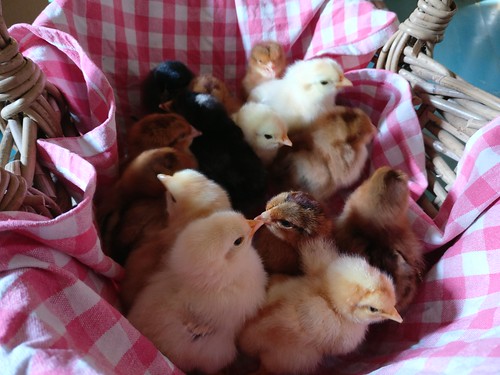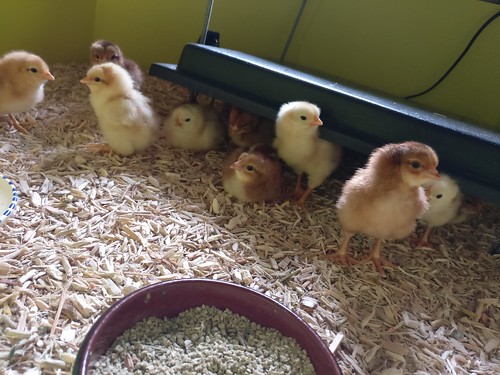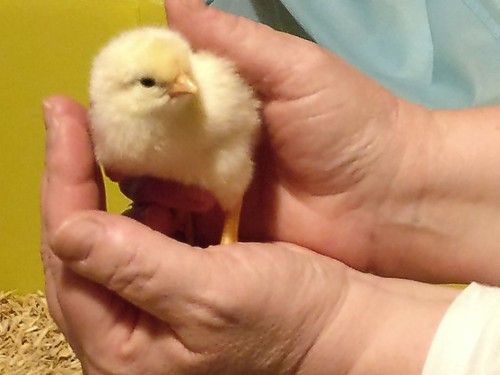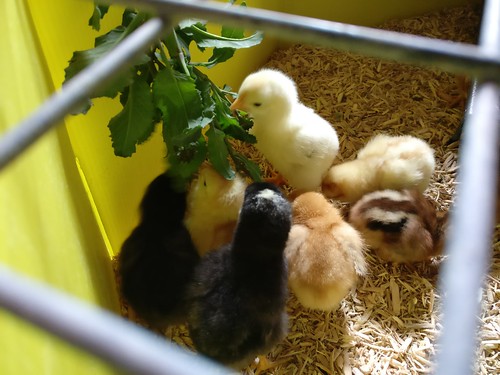Our little flock of six hens is keeping us well stocked up with eggs at the moment and we sell our surplus via an honesty stall at the top of the drive. At the beginning of the year, though, we had to go and buy eggs because production had gone right down and that went on for several weeks. Out of our six hens, only two are young and productive, although last Winter, at the end of their first laying year, even they stopped laying after their big moults. The other four are getting rather old: Mother Hen Betty is five years old and the other three are about one year younger than her so their productive years are behind them now. They still lay but some not reliably so we decided to add to our flock this year.
About four weeks ago, we collected some fertile eggs to incubate. We bought 12 Welsummer eggs from a local farm; they lay dark brown eggs and are very colourful birds. We were also given some Skyline eggs and I was excited to try that breed because they lay blue eggs. We also got some Blackrock, Sussex Ranger and Pied Ranger. All in all another batch of 12 mixed eggs.
We had an arrangement with our neighbour Paul: he would lend us the incubators and I would do the rest. He would have half of the new chicks, including any cockerels (although we may keep one!). We were aiming for 20 eggs but in the end, 24 went into the incubators, clever little machines that mimic what the hen does when she sits on the eggs for 21 days.
The egg, if fertile, contains everything it needs to bring new life into the world, given the right conditions. It is full of potential and when I placed them into the incubators, it felt I was holding the perfect symbol for Spring and that moment felt very special indeed. For 18 days, the eggs are kept at a constant temperature of 37.5°C, with a humidity level of 45% and are turned at regular intervals. After that, the incubator increases the humidity level to 60% to soften the egg shell and the eggs stop turning. Hatching happens at 21 days.
Hatching date for our 24 eggs was on Monday and to our surprise, when we went to check on Sunday, a few eggs had started to "pip" and we could hear chirping sounds. Over the next couple of days or so, we witnessed the wonderful process of eggs transforming into chicks. New life was being brought to us. What a delightful distraction from the worrying news and the tough time we are all having coping with the Covid-19 pandemic and its devastating repercussions.
Just as the Easter weekend arrives, we have a lovely, lively clutch of 16 chicks to look after. They are very entertaining and already have their little personalities coming through. They have a brooder in their pen to retreat under to keep warm. It took them no time at all to learn how to eat chick crumb and drink water. They are already busy scratching and it is absolutely amazing to see these little creatures who are only a few days old already behaving like grown up chickens! I have hung some bits of greenery from the veg patch for them to peck and they love that. They dart about very fast and counting them is an interesting task! The next thing will be to make guesses about who is a hen and who is a cockerel!
We welcome these little chicks into our fold and we relish the time spent watching them. They make us laugh and bring us joy and hope, the perfect manifestation of Spring at Eastertime.




Hi, Very impressive and you make it sound so easy....... Looking forward to hearing more as they grow.
Posted on By Simon Wilde
Hi Simon Thanks for subscribing to our blog. We are enjoying our experience of raising chicks. They are six weeks old now and growing fast! I am trying to guess who is a hen and who is a cockerel! Not very easy!!
Posted on By Maryline